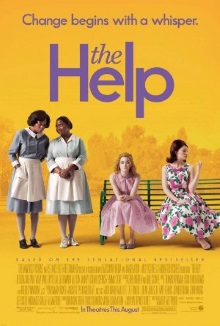
I think it says something that when my wife saw the DreamWorks logo appear, she adjusted her expectations accordingly, especially in the context of this being a film about white and black race relations in 1960s United States. We’d look out for a competently put together film that is aimed squarely at the mainstream market, a strong social message, plenty of entertaining bits and most of all an uplifting and hopeful ending. In the event, this was exactly what we got.
Set in Jackson, Mississippi, The Help concerns itself with the plight of the black domestic help hired by well-to-do white households. Key characters are maids Abileen Clark and Minny Jackson who are best friends, and young white college graduate Skeeter Phelan who realizes that telling their stories and those of other maids like them might just be the break that she needs to break into the publishing world of New York. The employers of the maids and Skeeter’s own family round out the cast and provide plenty of mocking anecdotes to amuse audiences.
The big surprise is that The Help is actually rather decent. Despite its director Tate Taylor being a relative unknown, he manages to turn in a film that is consistently entertaining, is emotionally affecting enough to be taken seriously and avoids pitfalls like being overly sentimental or dramatic. There’s still a pervasive feeling that this is a studio-made product instead of an artistic work. You can practically see the executives’ balancing act at work: a touch of darkness but not so much that it scares people, a bit of unhappiness for Skeeter to keep things grounded, some laughs here and there to keep people watching and so forth. But on the whole, it is a very watchable movie.
Cast-wise, Viola Davis as Abileen is the standout performer for me. Octavia Spencer as Minny is great too but it feels weird to give her a lot of credit for just being herself. Emma Stone demonstrates that she is competent when not doing Spiderman movies but is unexceptional. Jessica Chastain proves her range in a role that is very different from her normal ones even if her character’s arc seems only tangentially related to the main plot. 2011 was in fact her breakout year in which she appeared in both The Tree of Life, Take Shelter and this one. The other white performers aren’t noteworthy and I’m disappointed that their roles are basically caricatures to be mocked at. Interestingly, every character of consequence here is female. This is one film that has no difficulty passing the Bechdel test.
It is worth noting that the film opens with scenes of the rich white families of Jackson and those positively bored me. But I was hooked once it switched focus to the black community. One of my favorite moments is when Abileen realizes how ignorant Skeeter is of how threatening their endeavor would appear to the white community and how much danger embarking on it would put everyone in. Another good scene is when a bus is stopped and the driver tells all of the coloreds to get off because there had been a shooting. When Abileen fearfully hurries home through the darkness is probably the only moment of true menace in the entire film.
Still, for all that The Help is unable to break free of the Hollywood mould, it gets enough things right that it’s a film well worth watching. Bits like the trick Minny plays on the poor Hilly, and the reaction of Hilly’s own mother to it, strikes me as just the sort of thing a clever writer would invent out of whole cloth, but it’s hard to deny that they get the audience to laugh. In the end, this film feels very much like what it really is: a fictional film based on a fictional novel that is written by a well-meaning white person.